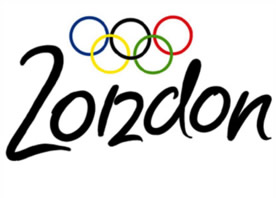
One of the men who enlivened the race amidst what was a pretty dull GC battle in this year’s Tour de France was Saxo Bank –Tinkoff Bank rider, Michael Mørkøv. The Dane wore the leaders’ jersey for the king of the mountains during the first week and was in the breakaway more than 800 kilometres during le Tour.
But Mørkøv’s roots stretch deep back into the timber boards of the velodrome and within days of finishing the world’s toughest stage race, he was lapping the London velodrome in that fastest and most skilful of disciplines – the team pursuit.
Mørkøv won his first track medal in the Danish junior team pursuit championships in 2001; by 2003 he was national junior points champion and made the elite points his own the following year.
He formed a very successful partnership with countryman Marc Hester in the UiV Cup (U23 Six Days)- but it was with Alex Rasmussen that he won the U23 European madison title in 2005.
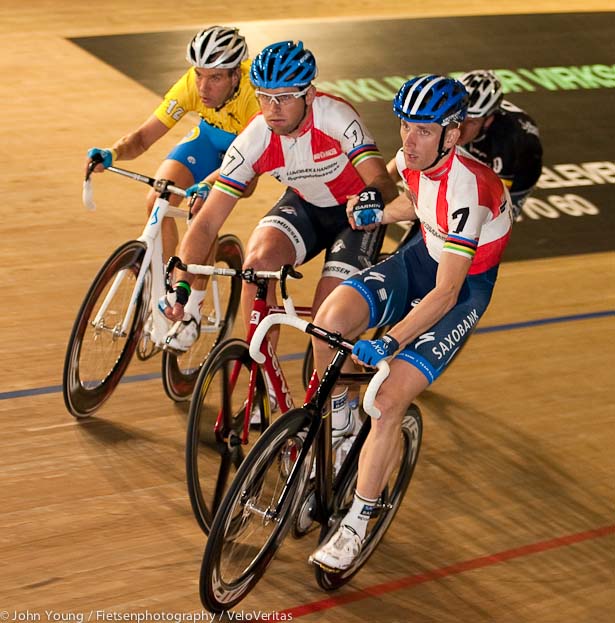
The following season saw him win national medals in the madison, TTT, pursuit, scratch and points – and he was now performing well at World Cup level in the team pursuit and Madison, with Alex Rasmussen.
In 2007 he lifted his first Worlds medal – bronze in the team pursuit – was second in the U23 Tour of Flanders and won his first six day with Rasmussen at Grenoble.
Olympic year saw him go home with team pursuit silver from Beijing, win multiple Danish championships and take his first UCI road win, a stage in the Giro del Capo.
There was a rainbow jersey in 2009, with Rasmussen in the Madison, and the duo also won the Six Days of Copenhagen and Gent.
His Grand Tour debut came in 2010 in the Giro where a young Saxo team performed strongly.
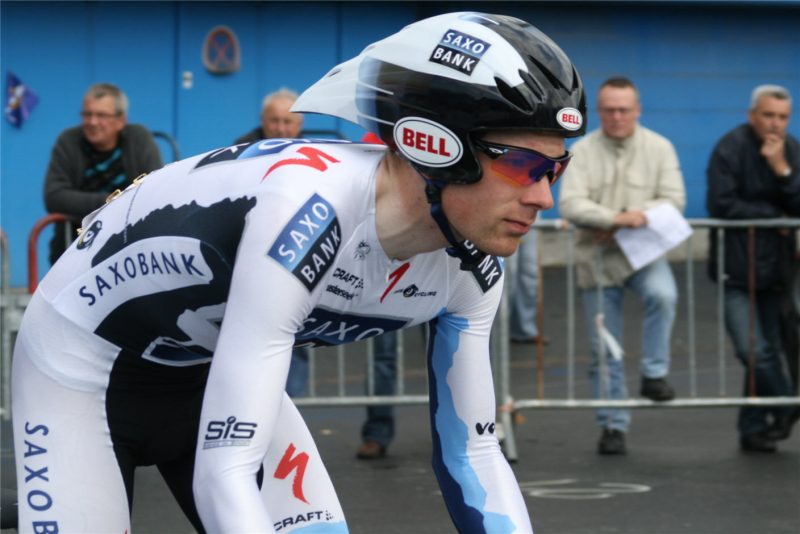
He again paired with Rasmussen to win sixes in Copenhagen and Berlin.
The Copenhagen Six Day hat trick came at the start of 2011, before he backed Alberto Contador to an emphatic win in the Giro d’Italia (later scrubbed from the record book).
There were wins too in Danish criteriums and a close second to Elia Viviani in a stage of the USA Pro Cycling Challenge in Colorado.
Last season ended with a fine 18th place in the world elite road race championships in his home city of Copenhagen.
This spring saw Mørkøv extremely active in breakaways in the cobbled classics, gaining valuable column inches and TV time for his sponsors.
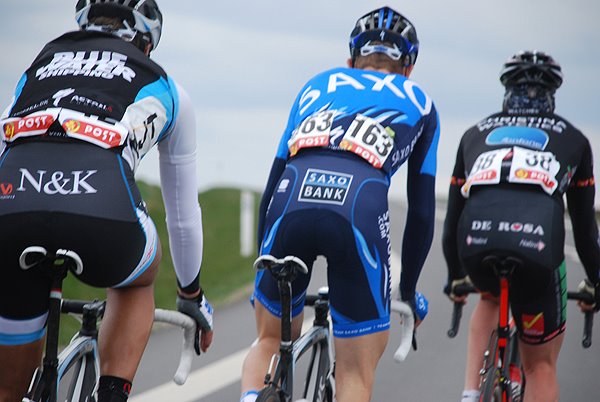
And his riding in the Tour so impressed Alberto Contador that he specifically requested Mørkøv be part of his Vuelta team.
We caught up with Michael in Denmark, a few days after he’d returned from London and about to ride a series of criteriums in Denmark.
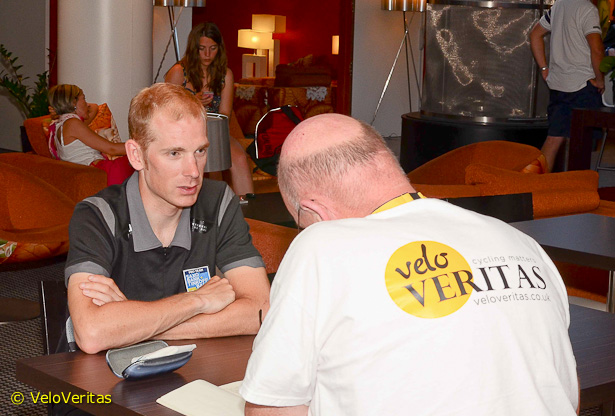
You wouldn’t get much chance to rest between the Tour and Olympics, Michael?
“I spent a few days resting but my recovery was good, quick.
“I started training on the boards at the Ballerup track in Copenhagen and was very pleased with how I felt.
“I was also pleased that we were able ride a 3:57 in London.”
It didn’t take long to find your ‘track legs’ then?
“I was worried that with coming out of the Tour I may have lost a few kilos and some power – which you need to push the big gears we ride in the team pursuit.
“But I couldn’t have gone any better; I think that riding the Tour de France was the perfect preparation for London.
“There were guys who doubted my ability to do both events – but I think I showed them that I could.”
What about getting used to changing?
“It’s a very technical event and you need a lot of skill to carry out the change properly– but you have to consider my background.
“I’ve been riding the track at the highest level since 2004 in World Cups and World Championships so I’ve developed my skills over a long period.”
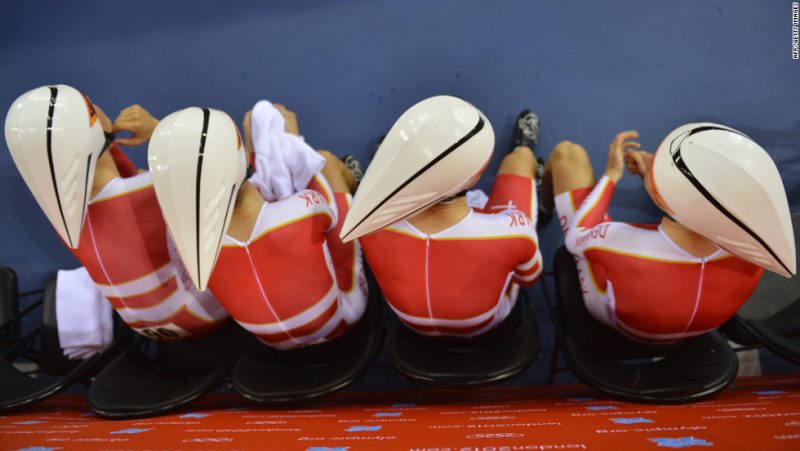
Talk us through the series please, Michael.
“They’ve changed rules; in the Worlds, you ride twice – to qualify, then fastest rides against second fastest for gold and silver, with third and fourth fastest going for the bronze.
“But at the Olympics there are three rides for the eight teams who qualified from the ten starters. We qualified fourth fastest with 3:58 behind GB with 3:52, Australia with 3:55 and New Zealand with 3:57.
“If that had been the Worlds, we’d have raced New Zealand for the bronze. But in the second round we were drawn against GB – it used to be that fastest went against slowest but in London it was first against fourth, second against third, fifth against eighth and sixth against seventh.
“They said it was the even things out so that there would be less teams being caught – if you catch and pass a team then you can lose an awful lot of time.
“We rode against GB and lost 3:52 to our 3:57.396; Australia beat New Zealand 3:54 to 3:56 and Russia beat The Netherlands 3:57.397 to 4:04.
“But it was also on time, you could win that ride but not go through; Spain won in 3:59 to 4:05 against Columbia but didn’t go through because their time was slower than the Russians. And New Zealand lost to Australia but went through because of their time.
“For the final it was fastest against second fastest for gold and third fastest against fourth fastest for bronze.
“If we’d gone 1/10th faster, we’d have ridden against New Zealand for bronze.
“But the thing is, if you look at Russia’s ride they were catching The Netherlands team and benefiting from the psychological aspect of seeing a team in front and also from the fact that in the last kilometre they’d be gaining from riding in the slipstream.
“Whilst in our heat we had the Brits going away from us and coming up behind us.”
How did the series in London compare to Beijing?
“London was really important for us, I joined the squad as the only experienced rider – the other guys were only 18, 19 and 21.
“I’m very proud of how they rode – a 3:57 was a brilliant performance from them.
“It was different at Beijing, whilst we were a young team we had results behind us and had been high in the standings at Worlds.
“Six months ago, the team blew up in the World Cup in London, so for Casper Joergensen to get all those guys to peak perfectly for the Olympics – that’s a great job by him.
“We missed being in the ride for bronze by a fraction of a second.”
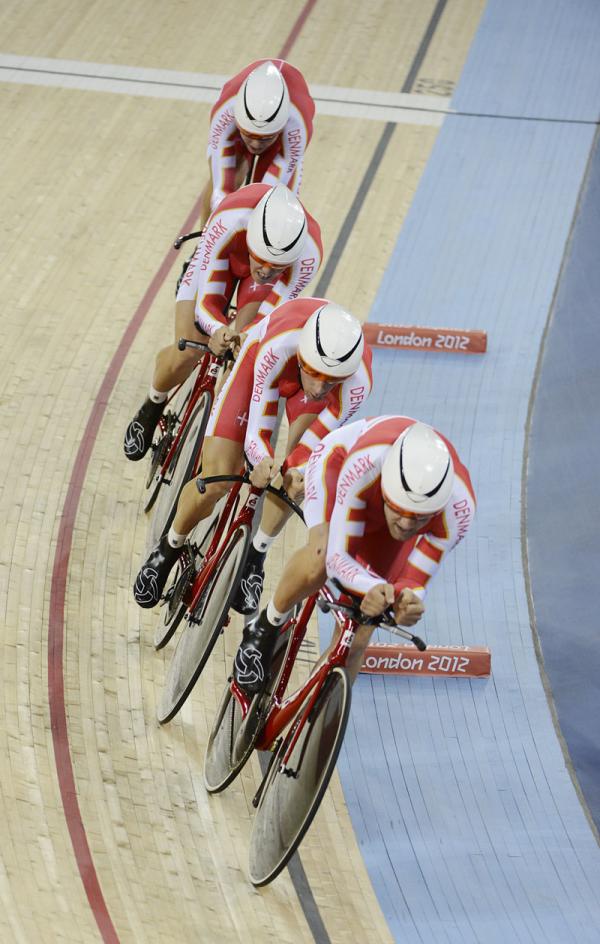
What did you think of the velodrome?
“The British public was amazing – the atmosphere was terrific.
“It was sold out every day and I heard that they could six times as many tickets.
“I just felt sorry that there were so few events for them – I think they’re the type of crowd who would have loved the Madison.”
And Denmark stuck with Cervélo?
“Yes, we had the very latest P4 model, initially I didn’t like the way it looked compared to my P3 but when I started to ride it I realized that it’s an excellent machine.
“We’re way behind the Brits, though – those are some nasty, fast bikes they have!
“We ride Mavic wheels and were on 55 x 14 – gearing is a confidential thing; I guess the Brits rode higher but I think New Zealand and Russia would be on the same ratio as us.”
How did the ‘vibe’ in London compare to Beijing?
“I liked it in London; it was good that it was relatively easy for the Danish fans to come over – which wasn’t the case in Beijing.
“But there were just so many people that you couldn’t get around – we were lucky because the velodrome was only one kilometre from the village but if you had to use a car or bus then it would have been a nightmare.”
Rio 2016?
“For sure – I was really looking forward to these Games but was worried coming from the Tour – but in the event we just missed out on a chance at bronze and that gives you ambition for the future.
“The Olympics are really special and I have my fingers crossed that the UCi might fight to have the madison and points back on the programme for Rio.”
It was a good Olympics for the Danish track squad.
“Lasse Norman Hansen’s win in the omnium was amazing – although it wasn’t a big surprise, he was our strongest in the team pursuit.
“The omnium is a strange event, you need to be strong, but you have to have luck, too.
“Before it we hoped for him to win, but it could just have easily been fifth place – it’s a historic win for Denmark, it’s 24 years since we had an Olympic champion.”
Is Saxo supportive of your track ambitions?
“There are no problems, Bjarne likes the track; and my coach is Brad McGee who used to ride the pursuit and team pursuit at the Commonwealth Games, Worlds and Olympics – so he understands.”
And Sr. Contador named you as a man he’d want on his Vuelta squad.
“That’s true and I was really flattered – he watched the Tour on TV and saw how I was riding.
“But the team has been named; I’m on the reserve list so it’s possible I may ride if one of the guys gets sick.
“I can tell you though that it’s a very strong Saxo-Tinkoff team which will be riding in support of him in Spain.
“I’m down to ride my home Tour of Denmark and I’m obviously very much looking forward to that.”
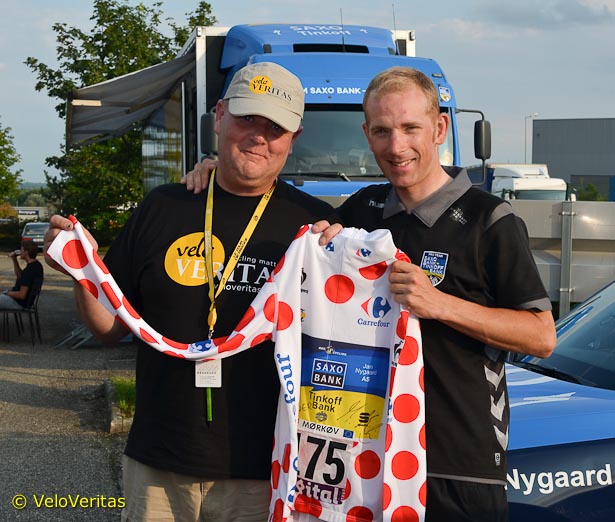
Will we see you in the Worlds?
“The way it’s looking, Denmark will only get three selections – so I don’t think I’ll be riding the road race.
“But I’m very much looking forward to riding the team time trial championships against Sky and all of the other big name teams.”



